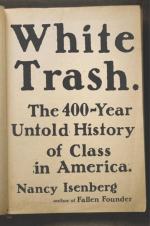|
This section contains 2,002 words (approx. 6 pages at 400 words per page) |

|
Summary
Isenberg begins this chapter by comparing the similarities between an unlikely duo, Elvis Presley and Lyndon B. Johnson. Both southerners challenged and disrupted the “historically toxic characterization of poor whites” (344). While the king of rock sexualized the country boy, Lyndon B. Johnson’s unexpected rise to the presidency transformed the hillbilly into a seemingly civilized and poised politician. Johnson’s track record as a modern progressive paled in comparison to his image as a southern boy. Although he strongly emphasized the importance of education and social equality, Isenberg notes that the “old country boy image” would continue to haunt LBJ (346).
Americans during the fifties and sixties were extremely class-conscious, regardless of their attempts to deny it. Housing became the symbol of class identity, and zoning laws virtually guaranteed a strict...
|
This section contains 2,002 words (approx. 6 pages at 400 words per page) |

|




